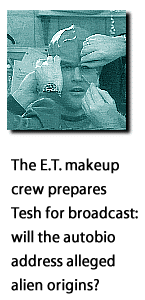

|
page 3 of 4 |

|
In the former, Kinski forsakes generic celebrity prose for a lurid,
monotonous expressionism: in his eyes, the
primary elements that compose the world are shit, semen, blood, hunger,
pus, and the occasional virgin.
You may not like the puking, spitting, overwraught satyr by the end of his
story, but at least you feel as
though you know him. In Confessions, Barris chooses to dispense with
"fact" altogether to get to the truth of his
life: purportedly, his career as a gameshow
producer and host was merely a cover for his true role as CIA hitman.
Throughout the course of Confessions,
Barris makes this possibility sound entirely plausible; the conceit
clearly demonstrates the prankish
genius that led to such triumphs as The Gong Show, and thus, does more
to impart the essential qualities
of the man than an encyclopedia of more verifiable details ever could.
Despite his many quirks and his own prankish nature, it seems unlikely that Tesh will give us something as illuminating as the works of Kinski and Barris. The Bland One has an extremely strong need to please, and in matters of formal public record, it always seems to quash the more irreverent aspects of his personality. Couple his inherently ingratiating nature with his conception of himself as a regular guy, and you have a recipe for literary boredom. Anticipating such fare, and half-remembering the tiny galaxy of dull star memoirs I've read over the years, I wonder why so many celebrities take the trouble to publish such uninspired, conventional accounts of their lives. For some down-on-their-luck types, money is undoubtedly an incentive. But many celebrity autobiographers, Tesh included, already rest on millions: can the extra fluff of a few hundred grand make any difference? |


